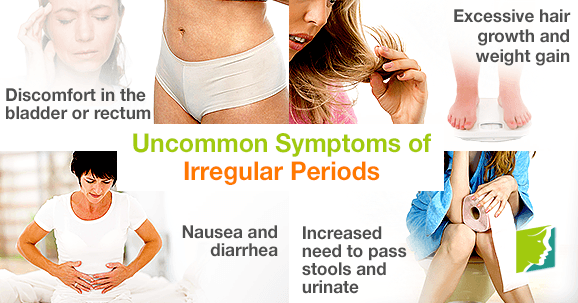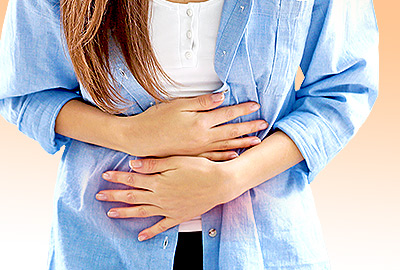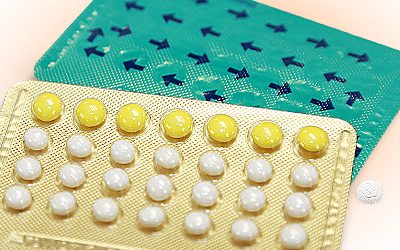Irregular periods are a commonly experienced menopause symptom, caused by imbalanced hormone levels in a woman's body as it prepares to stop menstruation permanently. Defined as menstrual activity that differs from a regular cycle, this is a normal part of menopause that's not usually cause for concern. However, menstrual irregularities can also be symptomatic of more serious conditions. During perimenopause, when a number of physical and emotional changes take place in the body, it can be difficult to determine whether your irregular periods are related to menopause, or whether they're suggestive of other health problems.
Understanding Irregular Periods
It may be helpful first to understand the normal symptoms of menopause-driven irregular periods, to help you recognize what is therefore uncommon and cause for concern. During menopause, imbalanced levels of estrogen and progesterone that drive the menstrual cycle become imbalanced. This causes increased thickening of the uterus wall, sporadic ovulation, and fluctuations in the duration of bleeding. Common symptoms of these include several months passing between periods, heavy bleeding, and cramps during bleeding. You should also expect varying consistencies of vaginal discharge between periods and random swelling of the breasts and lower abdomen caused by erratic water retention.
Though these symptoms are not necessarily pleasant, their effects can be controlled with lifestyle adjustments and herbal remedies. On the other hand, uncommon symptoms of irregular periods may be indicative of medical concerns that are not associated with menopause. Here's what to look out for.
Discomfort in the Bladder or Rectum
Discomfort or pressure upon the bladder and rectum alongside irregular periods could be symptomatic of uterine fibroids. These are non-cancerous growths that develop and reside in the inner lining of the uterus, and are usually benign. They are more likely to afflict women between the ages of 40 - 50 (i.e., during perimenopause) because it is suspected that fibroids are influenced by estrogen production. Another symptom of uterine fibroids directly connected to menstrual irregularity is infertility.
Excessive Hair Growth and Weight Gain
Irregular periods, excessive hair growth (hirsutism), obesity, and infertility are all symptoms of polycystic ovary syndrome (PCOS). PCOS occurs when the ovaries produce large amounts of the male hormone androgen, causing the formation of cysts and preventing eggs from maturing. If left untreated, this symptom increases the risk of contracting cancer of the uterine lining, type 2 diabetes, strokes, miscarriages, and liver disease.
Nausea and Diarrhea
Nausea and diarrhea with irregular periods could be symptomatic of pelvic inflammatory disease (PID); other symptoms include pain in the lower abdomen and back and odorous discharge between periods. PID is a bacterial infection that can be spread through sexual contact or through vaginal insertions associated with childbirth, miscarriages, or abortions. It can spread to the uterus, upper genial tract, and reproductive tract and, if untreated, could cause infertility, ectopic pregnancies, abscess formation, and chronic pelvic pain.
Increased Need to Pass Stools and Urinate
This could by suggestive of a thyroid disorder. Alongside irregular periods, other symptoms include the appearance of excess fat in stools and unexplained weight loss. The thyroid plays a significant role in regulating metabolism and secreting hormones, and a disorder could increase the risk of contracting heart problems, osteoporosis, or experiencing pregnancy complications.
Looking out for uncommon symptoms of irregular periods will help you to differentiate between changes in the body occurring as a result of menopause and changes occurring due to underlying health problems. If you notice symptoms that differ from those normally associated with menopause, it is worth scheduling an appointment with your gynecologist or doctor at the earliest opportunity. Read more about natural treatments for irregular periods.
Sources
- Centers for Disease Control and Prevention. (2011). Pelvic Inflammatory Disease (PID) - CDC Fact Sheet. Retrieved January 31, 2014, from http://www.cdc.gov/std/pid/stdfact-pid.htm
- The Cleveland Clinic. (2010). Abnormal Menstruation. Retrieved January 31, 2014, from http://my.clevelandclinic.org/anatomy/female_reproductive_system/menstruation/hic-abnormal-menstruation.aspx
- The Cleveland Clinic. (2011). Uterine Polyps. Retrieved January 31, 2014, from http://my.clevelandclinic.org/disorders/uterine-polyps/hic-uterine-polyps.aspx
- Johns Hopkins Medicine. (n.d.). Thyroid Disorders in Women. Retrieved January 31, 2014, from http://www.hopkinsmedicine.org/healthlibrary/conditions/endocrinology/thyroid_disorders_in_women_85,P00437/
- National Health Service UK. (2013). Causes of irregular periods. Retrieved January 31, 2014, from http://www.nhs.uk/Conditions/Periods-irregular/Pages/Causes.aspx
- National Health Service UK. (2012). Symptoms of overactive thyroid. Retrieved January 31, 2014, from http://www.nhs.uk/Conditions/Thyroid-over-active/Pages/Symptoms.aspx




